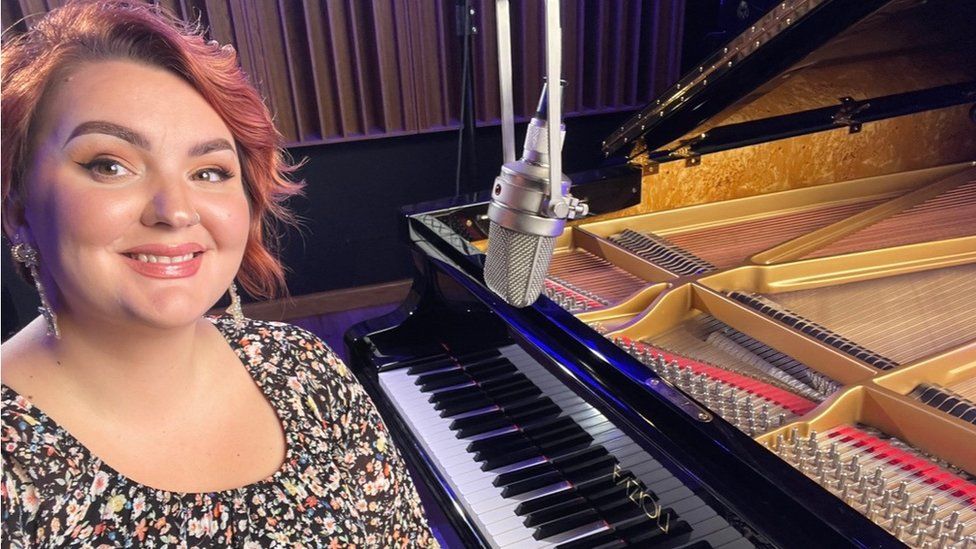ADHD: Women tell of their diagnosis struggles
- Published

Bronwen Lewis: "I was seeing a lot of videos about ADHD I really connected with, they sounded like me"
Social media has led to some women being diagnosed with attention deficit hyperactivity disorder (ADHD) after recognising symptoms online, according to some sufferers and specialists.
GPs in Wales said it can take over a year to get an assessment on the NHS.
Singer Bronwen Lewis from Neath paid £650 for a private assessment but said others may not be able to afford to do the same.
The Welsh government said it was investing £12m to improve services.
Bronwen said: "I was seeing a lot of videos about ADHD I really connected with, they sounded like me and it looked like me.
"But then I was sitting in the car listening to a phone-in on Radio 2 about women who've been diagnosed later in life.
"Every woman sounded like me, had the same struggles as me, and had been misdiagnosed like me.
"And I just sat in the car and cried. It was a penny drop moment for me."
Bronwen had been treated for depression which she has since attributed to struggling with ADHD.
When she went to the doctor, she was told she would be waiting a year for an initial assessment for the neurodevelopmental disorder, so she decided to go private.
"Overall it cost me £650 privately for an initial consultation and an assessment for diagnosis and for me it was worth every penny, but what makes me so disheartened is that I know not everyone can afford that," she said.
'Addictive behaviour has damaged me'
Veronica Sommariva: "To be honest, my life could have been so different"
Veronica Sommariva, 42, from Cwmbran, Torfaen, has been diagnosed in the last year, also after going private.
"To be honest, my life could have been so different," she said.
"I have struggled all of my life with being different; addiction in terms of drinking and smoking and food.
"Addictive behaviour is something that has really damaged me in my life in terms of relationships."
She was told by the GP she was "burnt-out", and initially dismissed social media posts about the condition.
"I had seen some TikTok videos, but I thought ADHD was a cute excuse for millennials to be lazy," she said.
"Once I started to study and talk to my GP more about it, we knew that it could be the explanation of several unexplained little things that happened in the past 10 years from hormonal imbalances to my burnout.
"Being diagnosed has changed my life, not because I am cured, but because I have an explanation for several things that I hated myself for."
'It completely blindsided me'
Claire Campbell Adams: "It's something that had never ever crossed my mind"
Claire Campbell Adams, 42, from Newport, has been diagnosed in the past few months.
"It completely blindsided me," she said. "It's something that had never ever crossed my mind."
She said: "It's still difficult to talk about because it's the life I've missed and the life that I could have had if I had known," she said.
"My parents and teachers didn't have the knowledge and resources that we have now.
"There is now no excuse for these children to be missed.
"Everybody thinks ADHD is the naughty boy running around, not the girl that sits in the back and quietly looking out the window.
"She deserves as much attention, she's got a right to education as well."
Quantifying the number of women presenting with ADHD symptoms is difficult as health boards' data on those waiting for neurodevelopmental assessments includes autism assessments.
However, the ADHD Foundation said it has seen a 400% rise in adults going to them compared to before the pandemic, and many of those had turned to social media for answers after struggling in lockdown.
Its head, Dr Tony Lloyd, said: "Of that increase, more than half of them have been adult women who have struggled and for many years have been treated for anxiety, depression, obsessive compulsive behaviours and eating disorders which we know is very common for those with undiagnosed ADHD."
Dr Simon Braybrook, who has a special interest in neurodivergence, said he has seen a "big increase" at his practice in Butetown, Cardiff, since the Covid-19 pandemic.
He said global estimates suggest that ADHD presents in 2.5% of children and in "probably half of people it's less of a problem as they grow into adulthood".
"Whereas as our diagnosis rates are 1% or less so, actually, there is an increase in presentation but an increase that is coming up towards what we would expect in the population."
Dr Rowena Christmas, who chairs the Royal College of General Practitioners Wales, has also seen an increase in numbers at her surgery in the Wye Valley in Monmouthshire.
'Mask how their brains are feeling'
"We understand a bit more about ADHD now and we know there are different ways it can present," she says.
"Women with ADHD, when they're little girls, their minds might be just as distractible but they tend to sit more quietly," she said.
"They tend to mask how their brains are feeling to be more socially acceptable.
"But they'll have a lifetime of feeling quite different and have difficult relationships perhaps, or feel like they're just not functioning very well."
The Welsh government said it was working with people with neurodevelopmental conditions, including ADHD, their families and professionals to "make long-term improvements to neurodivergence services across Wales".
"We have committed an additional £12m over three years to improve services while strengthening support for families and carers who are waiting for an assessment," it said.
"We are also developing a 10-year Women's Health Plan for the NHS, to support a range of women's health issues."
- Published27 November 2022
- Published22 September 2022
- Published26 October 2021